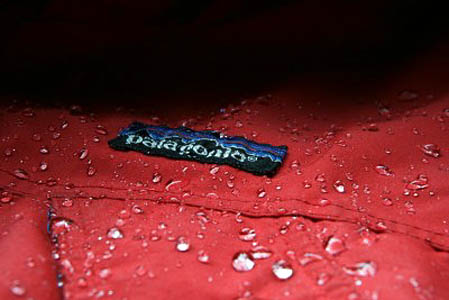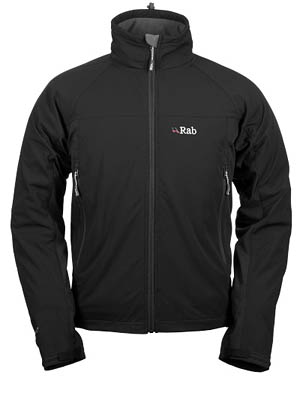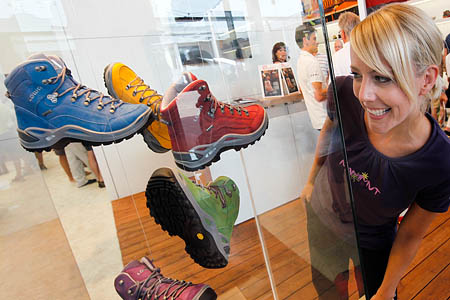Would you buy a used waterproof to wear on your next hillwalking trip?
It’s a question being posed by researchers from two English universities, prompted by an expert outdoors enthusiast who believes we may be too ready to ditch clothing and gear that still has years of life and usefulness.
The Explore RED project – RED standing for Re-use, Explore, Discover – is the brainchild of Don Gladstone, who says a Patagonia jacket he bought 13 years ago is still going strong, even though it now serves as a secondary piece of kit.
Gladstone’s working life began as a field officer for the British Trust for Conservation Volunteers but he has spent the last 16 years working in the outdoor industry.
“I bought my Patagonia Alpine Guide jacket in Manchester’s Alpine Sports, sadly no longer with us, ready for my first Chamonix trip in 1988,” he said.
“Since this time it’s been used on three continents and many countries in the warmest and most miserable of conditions.
“Incredibly well made, the jacket although now a little worn in places, has been superb and has remained functional in use for the last twenty two years. It’s still able to hold a durable water repellent treatment on its fabric and although now relegated as a spare piece of kit for visiting pals, it remains very functional indeed.”
He added: “It takes little imagination to realise the amount of used outdoor sports products in wardrobes, lofts and garages.
“The majority of these items still retain a great deal of the comfort and performance they originally provided their owners. Indeed, many of these items will provide the exact same comfort and performance as they did when first purchased.
“At best this category of product is barely worn and at worst it is discarded and can potentially be disposed of in landfill. In the last five years there have been numerous cases of companies being paid by councils to recycle unwanted clothing only for it to be found in landfill sites as far away as Indonesia.
“The Explore Red initiative will seek to raise public awareness of the many advantages of reusing discarded outdoor products.”
The University of Leeds will conduct a two-year research programme on clothing, footwear and equipment, with various users, ranging from casual walkers to outdoor professionals. Three MSc students from Lancaster University’s business school will also look at potential charity partnerships, consumer buying habits and potential trade partnerships for a scheme re-using discarded gear.
The core research will probe consumers’ expectations when outdoor products are bought; the wear and tear on a range of clothing and equipment over an 18-month period; how comfort and performance are retained; the social and commercial value of the products, and how sustainable practice might be encouraged beyond traditional outdoor communities.
An online survey is available for outdoor enthusiasts on the Explore RED website, with the incentive for participants to win, paradoxically, a brand-new Rab Baltoro Light jacket.
As luminaries from the outdoor clothing and gear industry prepare to gather for the huge Friedrichshafen trade show, the Explore RED project will come as a timely reminder of the need for outdoors enthusiasts to consider the consequences of their purchases.
Tom Richardson, gear editor of Climb magazine, and one of the testers in the research project, said: “As a mountaineer and outdoor enthusiast I, like many others, feel that I am subject to at least two contradictory pressures.
“The first is the desire to preserve the beautiful and wild places that we love and that give us more than pleasure, perhaps meaning to our lives, even our sanity.
“The other pressure comes from commercial companies, who are also trying to earn an honest living, trying to persuade us to acquire more and more equipment or clothing with which to enjoy our outdoor experience even more. As we consume, we use more natural resources and produce more land fill and indirectly put pressure on the mountains and wild places.
“I think that there are at least three small-scale modest first steps that can help a bit.
“The first step would be to acquire less stuff. Buy only what you need. The second is to only buy clothing and equipment that will last a good while and then look after it. Most of our heroes of the past did relatively more than us with a lot less.
“The third is a change of mind-set. Rather than thinking about replacing gear, think about replacing the owner of the gear. When you have finished with any item, offer it to someone else either directly or via a suitable organisation.
“What to you or me may be worn-out might not be to a porter on Kilimanjaro, a Sherpa in Nepal or even someone else in the UK.
“In this way we might improve the quality and durability of outdoor gear, increase its availability, reduce landfill, pollution and much else – just a bit.”
Researchers under Dr Katie Beverley and Dr Mark Taylor will look at clothing, footwear, equipment, kayaks and mountain bikes over a 24-month period, though Gladstone hopes to extend the project.
Tests will be carried out on new products and quarterly throughout the lifetime of the project. The results of the testing will be used to develop best practice guidelines on the reconditioning of used products.
All clothing will be visually examined for wear and tear and a range of tests will assess the water repellency, water resistance, breathability, thermal insulation, air permeability and wicking of garments.
Footwear will be visually inspected for wear and tear with tread depth measurement, water resistance, impact absorption and sole friction also recorded as appropriate.
For the bikes and kayaks, visual examination will be backed up with expert advice on the need for servicing and reconditioning.
A small group of testers will leave Britain for a minimum of six months on separate journeys and expeditions heading for the Himalaya, Mongolia, USA, Lebanon, Libya, Romania and other countries.
More information on the project, along with the survey and a chance to win the Rab jacket worth £110, are on the Explore RED website.




Ian Beswick
13 July 2011When i replaced my "too heavy" tent for the Pennine way Millets had a part exchange scheme which saved me a % on my new tent and found my old one a good home. This would be good practice for all retail/manufacturers.
Robin Dearden
15 July 2011There is a pretty good market for used gear on ebay. I have sold numerous items, jackets, rucsacs, fleeces when I have upgraded and have had good feedback from the buyers that they have been used!! And I have made a few quid to offset the purchase of shiny new things - everyones a winner!
chris jones
18 July 2011Has my gear a finite life?, it depends, paramo waterproofs go on forever, goretex has a finite life. Boots with membranes leak after a couple of years of heavy use, I have started using waterproof socks, fleeces go on for years. I don't waste money on the latest colourway for the season and ebay is used for some buying/selling like most people I suspect.
Gordon
20 July 2011UKClimbing.com also has a busy gear for sale forum....
Graham Watson
27 July 2011In Switzerland a couple of years ago I noticed a rope manufacturer (Millet I think) offering discount on new rope in exchange for old climbing rope brought in for recycling. Does it still happen and could it work in the UK?
Fred Oldgitt
31 July 2011My kit is so old I do not even understand the stuff they are selling in the shops these days
R Webb
01 August 2011Sooner or later, gear wears out - but it is all part of the fun getting every last trip out of an item. (Take care with critical items like ropes though).
There was a time when new gear was something you wanted to get some wear on - fast. It carried a bit of a stigma.
Markkit
02 August 2011Maybe I'm preaching to the choir, but:-
I buy most of my outdoor clothes from charity thrift stores, its amazing what people get rid of and the charity store often has no idea of the price of some of the smaller outdoor manufacturers, so nice product is sold cheap.
My rucksack is an old aluminium frame from a charity thrift store with a dry bag strapped to the back.
My hiking thick leather boots are Lowa Banff and waterproof enough even though they have no waterproof membrane so no membrane failures to be had.
Also I will wear my polyester tops, fleeces, trousers etc until they fall apart, stains and tears are just signs of use and not reasons to bin.
I chose function over style and most consumers chose style over function. A slightly worn item of outdoor gear sold for peanuts at a charity thrift store is one mans junk, but my treasure.
At the end of the day I find most performance wear overrated, especially when I think of explorers in the antarctic or climbing Mt.Everest wearing wool and waxed canvas, carrying aluminium frame backpacks. I don't even come close to that kind of performance, so why do I need fancy gear when those explorers didn't.
We are made to believe that our gear is so important that we forget how strong and resilient our bodies and minds can be. We don't need all the new gear we just need to toughen up a little.
Not just that; the more new gear we buy the more non-biodegradable waste we'll create.
Ander Broadman
08 August 2011Personally, I think most of theres's some barking up the wrong tree going on here-
1) The vast majority of 'outdoor gear' is bought for 'non-outdoors' use. It is essentially bought as fashion-wear.
2) Whether bought for outdoors use or not, the vast majority of people will change their gear before it wears out. As Mark Twight pointed out- the ego is important in climbing (you could argue the ego is the reason we go climbing) and if a new jacket makes you look the part, then good. Twitht recognised the important things were to look good and perform in the activity over 'durability'.
3) Yep, tough people have been to the North Pole in a tweed jacket. But a hell of a lot of them died/ lost fingers, etc. Yes, everybody endured a lot in the old days. They also had substantially shorter life expectancy.
4) It's great asking the world to change to fit your view of it- but they don't without incentives. It's more effective to change your methond of operating to fit the way that 'joe average' works.
What I advocate, then, is that equipment is made as 'efficiently' as possible. What I mean by efficient is that it isn't made to be 'bomb-proof' and last forever, but is made to last as long as someone is likely to want it. That will vary depending on the item/ use it is likely to be put to. For the majority of clothing that will mean the use it's put to is trying to look good at either the pub, or for that matter the crag.
The real driver here is the driver for fashion. I'm not sure if that's driven by manufacturers who change their gear every season, or by the people who demand new gear every season, but that's substantially the world we live in, and for everyone who wishes otherwise, there are dozens if not hundreds who think more conventionally. You'll only get them to change by increment, and so you've got to work on that basis.
Charity gear... well that's an economic question that is essentially saying that there are people who should be subject to charity. That's driven by inequality- systemic inequality. It would be better if we were part of a system that enabled people to buy their own outdoor gear in the first place- that everyone has a fair claim on the worlds resources.
The features of good outdoor clothing are therefore:
a) It looks good
b) It performs excellently
c) It lasts for a season or two's use
d) It's components use the minimum of resources
e) It's components can be recycled/ scrapped easily
f) It is manufactured in a socially responsible 'fair trade' manner.
KT
16 August 2011I bought my first waterproof jacket from ebay back in 2004 and it lasted me until last year with all the washing and reproofing done to it. Just like my rucksack. I use my boots until they fall apart - about 2-3 years - and have been patching up my favourite waterproof and walking trousers for many years now.
I agree that most of the gear out there now is just for fashion wear and it put me in a tight spot when my waterproof jacket wore out finally. All big brand outdoor stores I went to would not give more than 12 months' guarantee and to be honest, that's just not enough when they are asking for £2-300. Eventually I bought a Gill for less and it served me wonderfully during this year's stroms in May in Scotland. Forgot to mention, it came with a lifetime guarantee.
I have been using my socks - both normal and waterproof for many years now, the latter will soon need a replacement.
When I go outdoors I don't look the most fashionable at all, but then that is not what we are going to the mountains for, is it? :)
If someone has a good choice for boots that are comfortable, flexible and will last for ages, I'm all for suggestions! I need a new pair soon.